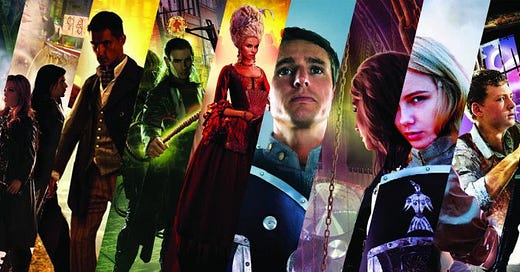
For a very long time, my primary pleasure-reading material has always been in the SF genre (in the inclusive sense of “speculative fiction” that include bot science fiction and fantasy). For a while there, I was pretty plugged into the fan awards scene, making an effort to read the Hugo nominees, and often buying Worldcon memberships to vote (even if we didn’t go in person all that often). Collective fannish tastes, though, particularly in the Hugo-and-Nebula sort of subcategory, have largely moved in directions that I don’t find that appealing, and as a result I’ve kind of decoupled from the genre, aside from a handful of authors with ongoing series.
One of these is the Maradaine series of secondary-world fantasy novels by the insanely prolific Marshall Ryan Maresca, who has published 14 novels in the series since 2015. These at least start out as a set of discrete series of books— one about a masked vigilante, one about a pair of police detectives, one about a crew doing heists, etc.— but they gradually begin to interconnect, and in the most recent couple of books, all the principals from all the series know each other at least a little bit. These are all centered on the sprawling city of Maradaine, a maze of distinct neighborhoods, which is nominally a kind of constitutional monarchy, but suffers from the usual secretive rule by corrupt elites that one finds in such books. And there is, of course, a conspiracy involving dark magic that is only gradually revealed as the series goes along.
I ran across one of these (the Holver Alley Crew) in Barnes and Noble a few years back, and followed up with the rest of the series. These are obviously doing pretty well, because he’s been able to publish 14 of them, but they’re almost entirely absent from the genre discussion that I see on social media (outside of Maresca’s own indefatigable self-promotion on Twitter…). Which in some ways isn’t that surprising, as they’re packaged very much like a Generic European Medievaloid Fantasy kind of deal (though probably more Renaissance-oid, given the tech level), and, you know, they’re mostly zippy genre exercises. They’re not attempting to grapple with Serious Issues or break dramatic new literary ground in the ways that people like to talk about these days.
Of course, in a lot of ways, that’s also the principal attraction of the series for me. These are fundamentally zippy genre novels where some dark stuff happens but the Good Guys (mostly) win in the end, and they mostly don’t involve fifty-page fictionalized subtweets of contemporary political debates. They’re kind of refreshing in a way that a lot of more acclaimed stuff is not.
They’re also better than that probably sounds, though, in that what Maresca is doing is fundamentally pretty hard to pull off. He’s writing in several different subgenres at once, with each sub-series having a moderately distinct feel, but getting them all to more or less fit together. The setting has an impressive amount of background detail, and the overarching plot is complex enough to keep you guessing, but the individual novels mostly resolve in satisfying ways. It’s quite the trick, and he’s doing it with a fair bit of aplomb.
Over the last couple of months, I’ve read the two most recent of these, An Unintended Voyage (which came out back in November) and The Assassins of Consequence, which I blew through in about two days after its release last week. They’re both solid entries in the overall series, though neither would be a good starting point for a reader new to the world.
An Unintended Voyage picks up a loose thread from a few books prior, namely the abduction of Corrie Welling, one of the most junior members of the police family introduced through her oddball genius brother Minox starting in A Murder of Mages. Corrie finds herself indentured in a foreign land on the far side of the world, in a city that desperately needs some honest policing. She needs to learn to make her way, protect her new-found friends, and disrupt some dark plots while also finding a way to get free and get home to her family.
The Assassins of Consequence on the other hand, is very much in the core chronology, centered on Veranix Calbert, university mage in training and masked vigilante, who was first introduced in The Thorn of Dentonhill way back at the very start of the series. This is kind of the Spider-Man: No Way Home of the series: a collection of Veranix’s enemies have learned his secret identity, and come to settle old scores, with serious consequences for him and his friends and supporters.
Anyway, they’re both good, solid continuations of the overall project, with plots that resolve well enough to be enjoyable on their own, and enough threads connecting to the rest of the series to keep me wanting more. Don’t start with these, but if you want some good old-fashioned escapist fun, by all means go back to the start and check out the series as a whole. It’s quality work through at least 14 books, and by the time you catch up, there’ll probably be a couple more…
So, there’s a light-reading plug for you. Here’s a button if you want more of this sort of commentary:
And if you’ve read these and want to talk about them (or want to recommend other series or authors in the “escapist fun” vein), here’s a button for that:




I will give these a try!
Just curious (seriously not looking to fight): Any overarching reasons why you don't like the recent award-nominated stuff? I don't recall reading a book from the recent nominees that I didn't think was at least good, and a couple of the series ("Broken Earth" and "Lady Astronaut") are among my all-time favorites.